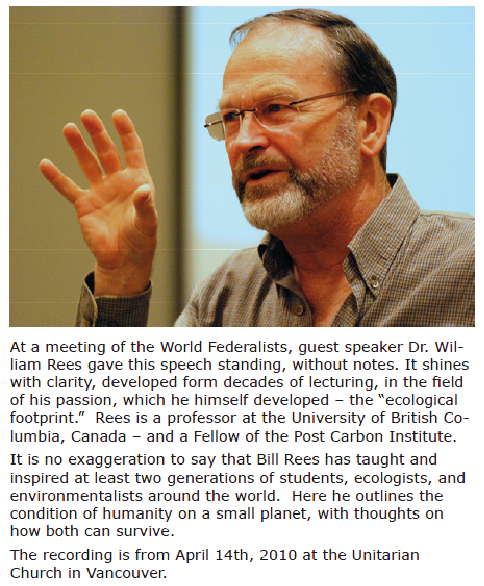Aubrey [in response to the letter below]
No, you have not misrepresented my position.
If the basic biophysical science is correct (and I believe it is) then humanity is in a state of potentially disastrous ecological dysfunction. Planned aggregate economic contraction, with consideration of the right of the chronically impoverished to a larger slice of the pie, is the only assured and equitable route to sustainability. C&C is part of this and the model should be extended to other forms of consumption/waste generation.
You can certainly add my name to the list.
Best,
Bill Rees
~~~~~~~~~~~~~~~~~~~~~~~~
Dear Bill
Please, may I ask you whether you will you consider supporting GCI's C&C Proposal to the UNFCCC. It is really important to me, so forgive me please for pressing you.
I feel you are and have been such a central figure in the unfolding epistemology of this story. This is not least because you are the only person to my knowledge who, as a high profile academic, has called for what amounts to 'a planned economic collapse'. Forgive me, maybe I am over-stating your position using that phrase, but it seems clearly to me to read that way and this is clearly [what ever we call it] what somehow we now have to achieve.
C&C was presented to UNFCCC in 1996 effectively saying that and giving, for better or for worse, a mechanism whereby that very difficult transition might be 'negotiated'. An increasing number of voices agree with that and now openly say that C&C also provides a model for the 'containment of other factors and vectors' that are presently inimical to a stable and perhaps sustainable future. I think - I certainly hope - that is helpful.
The details of the proposal submitted by GCI are on this web-page: - http://www.gci.org.uk/UNFCCC_Submission.html
Sent out only a few days ago, there is already some support building for this: - http://www.gci.org.uk/UNFCCC_Submission_Co-Signatories.html
It would be *welcome, useful and influential* if your name were added in support of this proposal to the UNFCCC.
The UNFCCC are now debating the way ahead beyond 2012 and invited submissions from observer organisations. The proposal is a very straightforward re-statement of how to use C&C as the collective basis of the negotiating framework needed for UNFCCC-compliance.
So if you feel you are able to support the present proposal - I very much hope you do - please will you send me [minima] a one-line e-mail saying just that and I will add your name and affiliation to the list that is being collected and conveyed to the UNFCCC Executive.
With best wishes
Aubrey Meyer
GCI
The really inconvenient truth, which we do not wish to discuss, and certainly is not on any political platform to date, are these ones. This is actually a statement from the World Business Council on Sustainable Development, or at least the output from a workshop they held in the early '90's in Antwerp, Belgium. Looking at the data on material resource trends, pollution around the Earth, matching this against production and carrying capacity, that workshop concluded that in the industrial world, reductions of up to 90 percent would be required by the middle of this century, in order to enable necessary growth to occur in the Third World, and to keep the whole within the carrying capacity of the planet.This is now a version of what we call 'contraction and convergence.' We in the rich countries have got to slow down. In fact reduce our consumption to create the ecological space necessary for those who deserve to grow, so that they can come up to a decent standard. Keep in mind there are now officially a billion people on Earth who are malnourished, that's calorically malnourished.. And probably another two billion who are deficient in some dietary standard or other. We don't notice, because we've always had plenty in this resource-rich part of the planet. But the fact is, about half the people on Earth are still living the Malthusian dilemma. Just based on our consumption date, we in North America should be designing an economy that uses 80 percent less in absolute terms in order to create the space for others to gain their fair share.
Contraction and convergence has to be the way, if you are going to have equity on a single planet, and sustainability at the same time. We should be designing a smaller, equitable steady-state economy, that maintains itself within the carrying capacity.
Professor William Rees
School of Community and Regional Planning at the University of British Columbia (UBC).

